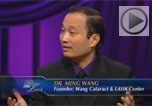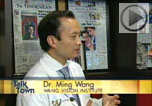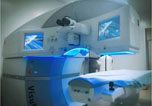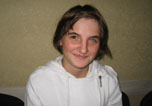- Over 55,000 LASIK and cataract procedures (including on over 4,000 doctors)
- The FIRST center in TN to offer Laser Cataract Surgery
- Introduced bladeless all-laser LASIK to the state
- Implanted the state's first FOREVER YOUNG™ Lens
- The first surgeons in the US to perform a new Intacs surgery to treat keratoconus
- Helped patients from 40 states and 55 countries
- International referral center for cataract surgery and LASIK complications
- Read Dr. Wang's book: LASIK Vision Correction
Why did you decide to have LASIK? Why did you choose Dr. Wang? How has your life changed since your LASIK procedure?
What is your advice for people considering LASIK?
Click to read more
| Article Library | Print This Page |
LASIK Eye Surgeon
Wang Vision 3D Cataract and LASIK Center, Nashville, Tennessee
Nashville LASIK Eye Surgeon / entrepreneur Wang has vision for new anti-scarring treatment
Nashville LASIK eye surgeon Dr. Ming Wang and EyeVU, a biotechnology company he co-founded last year with Vanderbilt University, could revolutionize the treatment of eye trauma.
The company this month successfully manufactured its first amniotic membrane contact lens and is now set to take the product through the Food and Drug Administration approval process.
"We're now designing the FDA clinical trials," Wang says.
EyeVU was founded last year with Vanderbilt University as its primary investor.
"Early this year we made a crude prototype. About a month ago we made one that can be replicated in batch after batch," Wang says. "I have a patent on research that shows that if you put amniotic fluid onto an eye after an injury you can reduce the scarring."
The genesis of the amniotic membrane contact lens (AMCL) began at Harvard University where then-medical student Wang began to think about ways to stop corneal scarring that can lead to blindness.
His research showed that treating an eye with portions of amniotic membrane can begin a healing process that can prevent blindness in cases where loss of sight is almost a foregone conclusion.
"If someone goes to an emergency room with a chemical or thermal (burn) eye injury, there is really nothing we can do other than put in a few drops of antibiotics and wait helplessly," he says.
People suffering such eye injuries don't lose their eyesight immediately, but over time as the cornea begins to scar, he explains, descending the patient into increasing darkness until all is black.
Trauma-related corneal scarring blinds more than 15,000 people in the United States yearly and as many as two million worldwide each year, Wang says.
The amniotic membranes used to make the AMCL's come from human placentas obtained immediately following elective cesarean sections at the end of a normal gestation period.
Wang has performed corneal surgeries using pieces of amniotic membranes to rejuvenate the healing ability of the adult eye.
But the surgery is complex and is not without its problems. The grafting surgery involved in amniotic membrane transplantation can cause harm to the eye because suturing itself causes more inflammation and increases the chance of infection.
What Wang's AMCL proposes to do is take that process to a new level of ease and begin the healing process when the eye wound is in its acute stage. The idea is to treat those patients within 24 hours of their injury and the beauty of the procedure is that it is non-surgical and non-invasive and simple to accomplish, he says.
"Anyone who can put a contact lens on could use it," he says.
About a dozen lenses per eye will be needed over a post-trauma period of one to two months and the EyeVU lens kits can be stored for up to two years before use.
The target market for the AMCL once it comes to market will be surgical hospitals. The selling point is ease of use and the relatively cheap cost of the contact lens procedure compared to restorative transplants.
According to EyeVU's figures, the AMCL treatment will cost about $2,000 per eye, compared to $50,000-plus for a corneal transplant and post-surgical care.
Wang is a consultant to the FDA Ophthalmic Device Panel, a group that advises the FDA on new ophthalmological devices and procedures.
"We anticipate approval will be a smooth and fast. It has high benefits and low risk," he says.
Wang, a Harvard Medical School graduate with a Ph.D. in laser physics from the University of Maryland and post doctoral fellowship from MIT, was last associated with the Vanderbilt Laser Sight Center as its director.
He left Vanderbilt in April of this year to pursue the creation of the Wang Vision 3D Cataract and LASIK Center, his own laser surgery center and describes the departure from Vanderbilt as amicable.
"It's the same reason that a lot of other doctors go into private practice. You work in a large hospital for a while and you want to branch out," he says.
Wang has set up a LASIK eye surgery center in about 5,100 square-feet of space in the Palmer Plaza Building in Nashville. The Wang Vision 3D Cataract and LASIK Center leased the space in Palmer Plaza earlier this year for about $112,000 per year.
The Vision Institute will also serve as the headquarters for EyeVU's research process as it pursues FDA approval, he says, as well as Duke University and some large hospitals on the West Coast, he says.
draiford@bizjournals.com, 615-248-2222 ext. 110
© 2002 American City Business Journals Inc.
Our new texbooks
A 501c(3) charity that has helped patients from over 40 states in the US and 55 countries, with all sight restoration surgeries performed free-of-charge.




















